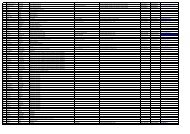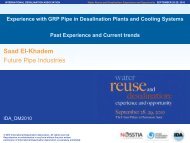View Technical Program - Levant Desalination Association
View Technical Program - Levant Desalination Association
View Technical Program - Levant Desalination Association
Create successful ePaper yourself
Turn your PDF publications into a flip-book with our unique Google optimized e-Paper software.
SINGAPORE’S EXPERIENCE IN ENSURING WATER SUSTAINABILITY<br />
Wah Yuen Long<br />
Director, Water Reclamation (Plants) Department- PUB -Singapore<br />
REF# IDA_DM2010-Long<br />
ABSTRACT<br />
Singapore, a small but highly urbanised and industrialised country, is water scarce in<br />
spite of it being situated in the equatorial belt and receiving its fair share of rainfall.<br />
Traditionally, Singapore’s water resources come mainly from 2 sources: i) imported<br />
water from its neighbour the State of Johor, Malaysia; and ii) water from its local<br />
but limited water catchments. However, even with half of its land area designated<br />
as water catchments, Singapore is not able provide for all its water needs. There is<br />
a need to look for innovative ways to increase its water resources to meet growing<br />
water demand. To this end, Singapore developed its “Four National Taps” strategy<br />
to ensure water sustainability. Of the 4 taps, 3 are essentially primary sources<br />
derived from water catchments or the sea i.e. local catchments; imported water;<br />
and desalination. The 4th tap is a secondary source from the successful recycling of<br />
used water from primary sources. Water re-use allows the multiplication of water<br />
resource by using the water more than once. High-grade reclaimed water, termed<br />
NEWater, is produced by passing secondary treated effluent through dual membrane<br />
process. NEWater is safe for consumption due to its high qualtiy but is largely<br />
used to supplement nondomestic water needs. The use of membrane bioreactor<br />
technology produces industrial quality water for industry use thereby cutting down<br />
the reliance on potable water. Effective public education and communications<br />
played an important part in convincing all that NEWater is safe for use. The public<br />
communications reached out to the populace, stakeholders and industries.<br />
Singapore’s Four National Taps strategy to ensure water sustainability is possible only<br />
through the efficacious application of innovation and technology, water demand<br />
management, water conservation efforts, proper land use planning, particularly in<br />
creating more water catchment areas, and public communications.<br />
Water Reuse and <strong>Desalination</strong>: Experience and Opportunity<br />
TECHNICAL PROGRAM 13




